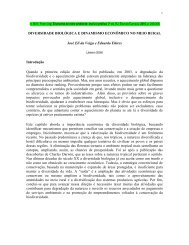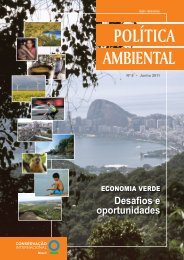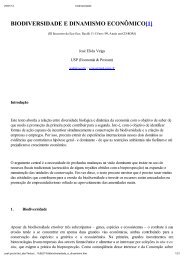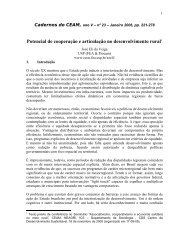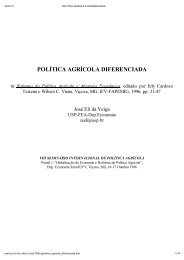sustainable development 20 years on from the ... - José Eli da Veiga
sustainable development 20 years on from the ... - José Eli da Veiga
sustainable development 20 years on from the ... - José Eli da Veiga
You also want an ePaper? Increase the reach of your titles
YUMPU automatically turns print PDFs into web optimized ePapers that Google loves.
78<br />
reducti<strong>on</strong> must also be mainstreamed into urban planning and land use management in order to build up<br />
<strong>the</strong> resilience of metropolitan areas.<br />
The settlement of border areas in recent decades has been an influential factor locally even<br />
though <strong>the</strong> number of new arrivals is small relative to nati<strong>on</strong>al averages. Until not l<strong>on</strong>g ago,<br />
envir<strong>on</strong>mental c<strong>on</strong>siderati<strong>on</strong>s and <strong>the</strong> interests of local (often indigenous) populati<strong>on</strong> groups have been<br />
largely overlooked in <strong>the</strong> course of <strong>the</strong>se settlement processes. More recently, increasingly strict<br />
regulati<strong>on</strong>s and more rigorous envir<strong>on</strong>mental and social assessment procedures have been brought into<br />
play. Settlement processes driven by emergency situati<strong>on</strong>s in which people were seeking safe havens or<br />
were displaced by border disputes have ceased to be a major factor.<br />
Internati<strong>on</strong>al migrati<strong>on</strong> has been <strong>on</strong> <strong>the</strong> rise and has become an influential factor in <strong>the</strong><br />
demographic dynamics of Latin America as well as in various o<strong>the</strong>r aspects. Issues such as remittances<br />
and <strong>the</strong> links between emigrants and communities in o<strong>the</strong>r countries have been discussed <strong>on</strong> <strong>the</strong> fr<strong>on</strong>t<br />
pages of newspapers, have given rise to <strong>the</strong> passage of new laws, and have been <strong>the</strong> focus of public<br />
policies and civil society acti<strong>on</strong>. Countries have become increasingly c<strong>on</strong>cerned about this issue and have<br />
engaged in talks in various forums with a view to <strong>the</strong> c<strong>on</strong>clusi<strong>on</strong> of agreements <strong>on</strong> <strong>the</strong> subject. Progress<br />
has been made, however, in creating stable instituti<strong>on</strong>al envir<strong>on</strong>ments for coordinati<strong>on</strong> in specific areas<br />
and in implementing joint mechanisms for dealing with issues such as migrant smuggling, undocumented<br />
migrants, social integrati<strong>on</strong>, repatriati<strong>on</strong> and <strong>the</strong> processing of asylum applicati<strong>on</strong>s. This is <strong>the</strong> directi<strong>on</strong> in<br />
which <strong>the</strong> good intenti<strong>on</strong>s reflected in policy agen<strong>da</strong>s <strong>on</strong> migrati<strong>on</strong> should be channelled.<br />
While progress has been made in terms of formal agreements and a growing awareness of issues<br />
that used to be passed over, such as <strong>the</strong> protecti<strong>on</strong> of migrants’ rights and <strong>the</strong> discriminati<strong>on</strong> to which<br />
many of <strong>the</strong>m are subject, <strong>the</strong> milli<strong>on</strong>s of undocumented Latin American immigrants in developed<br />
countries are in a very difficult situati<strong>on</strong>. Turning this situati<strong>on</strong> around is <strong>on</strong>e of <strong>the</strong> major challenges to<br />
be faced, and its resoluti<strong>on</strong> goes hand in hand with efforts to promote a global agen<strong>da</strong> that provides for<br />
<strong>the</strong> protecti<strong>on</strong> of migrants’ rights and that h<strong>on</strong>es in <strong>on</strong> emerging issues.<br />
O<strong>the</strong>r emerging migrati<strong>on</strong> issues include <strong>the</strong> displacement of populati<strong>on</strong> groups as a result of<br />
climate change, <strong>the</strong> depleti<strong>on</strong> of producti<strong>on</strong> capacity, <strong>the</strong> declining liveability of some areas (due to<br />
factors that are not necessarily related to climate change but may instead have to do with improper<br />
management) or mega-projects designed to meet <strong>the</strong> demands of a growing populati<strong>on</strong> and ec<strong>on</strong>omy.<br />
2. Sustainable urban and regi<strong>on</strong>al <str<strong>on</strong>g>development</str<strong>on</strong>g><br />
Cities are home to nearly 80% of <strong>the</strong> populati<strong>on</strong> of Latin America and <strong>the</strong> Caribbean. The urbanizati<strong>on</strong> of<br />
<strong>the</strong> regi<strong>on</strong> has brought about a significant change in <strong>the</strong> living c<strong>on</strong>diti<strong>on</strong>s of a large part of its populati<strong>on</strong>.<br />
Urbanizati<strong>on</strong> has, for <strong>the</strong> most part, enabled <strong>the</strong> regi<strong>on</strong>’s populati<strong>on</strong> to secure higher incomes, better<br />
health care, more educati<strong>on</strong> and access to basic services and c<strong>on</strong>sumer goods, as well as increase life<br />
expectancy. The correlati<strong>on</strong> between urbanizati<strong>on</strong> and ec<strong>on</strong>omic growth is also reflected in <strong>the</strong> statistics<br />
<strong>on</strong> relative levels of poverty in urban and rural z<strong>on</strong>es. People who reside in cities enjoy an “urban<br />
advantage” (UN-Habitat, <str<strong>on</strong>g>20</str<strong>on</strong>g>10). All indicati<strong>on</strong>s are that urban <str<strong>on</strong>g>development</str<strong>on</strong>g> is an essential element in<br />
industrializati<strong>on</strong>, sustained ec<strong>on</strong>omic growth and social <str<strong>on</strong>g>development</str<strong>on</strong>g>. Generally speaking, <strong>the</strong>re are fewer<br />
poor people, in relative terms, in urban areas than <strong>the</strong>re are in rural areas, since people in urban areas have<br />
greater access to services and to <strong>the</strong> labour market. If <strong>the</strong> cost of living is factored in, however, poverty<br />
levels in urban areas come much closer to those existing in rural z<strong>on</strong>es.



